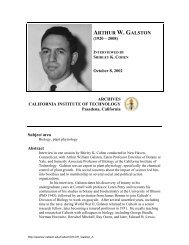Interview with Thomas A. Tombrello - Caltech Oral Histories
Interview with Thomas A. Tombrello - Caltech Oral Histories
Interview with Thomas A. Tombrello - Caltech Oral Histories
Create successful ePaper yourself
Turn your PDF publications into a flip-book with our unique Google optimized e-Paper software.
<strong>Tombrello</strong>–125<br />
ASPATURIAN: That would be a very difficult one to parcel out, I think.<br />
TOMBRELLO: Except I think it’s very clear Thorne’s going to be on it. The others I’ll not<br />
speculate about. But there might be others at <strong>Caltech</strong>. Certainly, Thorne himself has been the<br />
driving force in that whole thing. But again, it’s a crapshoot, because they haven’t detected<br />
gravitational radiation. [Russell A.] Hulse and [Joseph H.] Taylor [1993 Nobel laureates in<br />
physics] made the discovery of the indirect effect of gravitational radiation some years ago now<br />
by looking at the orbital decay of binary pulsars, binary neutron stars. It was a brilliant piece of<br />
work but not a direct observation; it was more calorimetry. It said that the binary system is<br />
losing energy at a rate consistent <strong>with</strong> gravitational radiation. They studied it for a very long<br />
time to prove that. So in some sense, there has already been a prize for the discovery of<br />
gravitational radiation. But the direct detection, as in the case of the direct detection of the<br />
neutrino, is an important thing that still has to be done. It could be done tomorrow. I was hoping<br />
it would occur while I was division chair, but it didn’t happen. Though it might take years<br />
before the prize actually is given. Because that’s what happened <strong>with</strong> the Politzer prize.<br />
ASPATURIAN: Thirty years.<br />
TOMBRELLO: That’s right. In the case of my brother-in-law [Robert C. Merton], who won it in<br />
economics <strong>with</strong> Myron Scholes, it took twenty-four years, because the first papers, the Black-<br />
Scholes paper and then Bob’s paper, which was back-to-back <strong>with</strong> it, came out in 1973. The<br />
history of that was a bit weird, too, because Bob didn’t try to publish his paper, because he knew<br />
that Myron and Fischer [Black] had actually come up <strong>with</strong> an important part of the idea first and<br />
their paper had been rejected for publication. It was only later, when their paper was published,<br />
that they put the two right together and published them. That was certainly a gentlemanly<br />
approach to it. The sad thing was that Fischer Black died of cancer beforehand, or it would have<br />
been a three-way prize.<br />
ASPATURIAN: That is sad.<br />
TOMBRELLO: Certainly, Fischer Black was a very interesting man. There’s a quotation of his<br />
that’s absolutely perfect and that lots of modern-day economists, including some that advised the<br />
http://resolver.caltech.edu/<strong>Caltech</strong>OH:OH_<strong>Tombrello</strong>_T

















